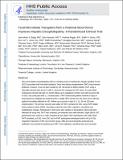Fecal microbiota transplant from a rational stool donor improves hepatic encephalopathy: A randomized clinical trial
Author(s)
Bajaj, Jasmohan S.; Fagan, Andrew; Gavis, Edith A.; Liu, Eric; Cox, I. Jane; Kheradman, Raffi; Heuman, Douglas; Wang, Jessica; Williams, Roger; Sikaroodi, Masoumeh; Fuchs, Michael; John, Binu; Thacker, Leroy R.; Riva, Antonio; Smith, Mark; Taylor-Robinson, Simon D.; Gillevet, Patrick M; Kassam, Zain; Gurry, Thomas Jerome; Alm, Eric J; ... Show more Show less
Downloadnihms-984983.pdf (1.468Mb)
OPEN_ACCESS_POLICY
Open Access Policy
Creative Commons Attribution-Noncommercial-Share Alike
Terms of use
Metadata
Show full item recordAbstract
Recurrent hepatic encephalopathy (HE) is a leading cause of readmission despite standard of care (SOC) associated with microbial dysbiosis. Fecal microbiota transplantation (FMT) may improve dysbiosis; however, it has not been studied in HE. We aimed to define whether FMT using a rationally derived stool donor is safe in recurrent HE compared to SOC alone. An open-label, randomized clinical trial with a 5-month follow-up in outpatient men with cirrhosis with recurrent HE on SOC was conducted with 1:1 randomization. FMT-randomized patients received 5 days of broad-spectrum antibiotic pretreatment, then a single FMT enema from the same donor with the optimal microbiota deficient in HE. Follow-up occurred on days 5, 6, 12, 35, and 150 postrandomization. The primary outcome was safety of FMT compared to SOC using FMT-related serious adverse events (SAEs). Secondary outcomes were adverse events, cognition, microbiota, and metabolomic changes. Participants in both arms were similar on all baseline criteria and were followed until study end. FMT with antibiotic pretreatment was well tolerated. Eight (80%) SOC participants had a total of 11 SAEs compared to 2 (20%) FMT participants with SAEs (both FMT unrelated; P = 0.02). Five SOC and no FMT participants developed further HE (P = 0.03). Cognition improved in the FMT, but not the SOC, group. Model for End-Stage Liver Disease (MELD) score transiently worsened postantibiotics, but reverted to baseline post-FMT. Postantibiotics, beneficial taxa, and microbial diversity reduction occurred with Proteobacteria expansion. However, FMT increased diversity and beneficial taxa. SOC microbiota and MELD score remained similar throughout. Conclusion: FMT from a rationally selected donor reduced hospitalizations, improved cognition, and dysbiosis in cirrhosis with recurrent HE. Keywords: Cirrhosis; Dysbiosis; Hospitalizations; Metabolomics; Stroop App
Date issued
2017-06Department
Massachusetts Institute of Technology. Department of Biological EngineeringJournal
Hepatology
Publisher
Wiley
Citation
Bajaj, Jasmohan S., Zain Kassam, Andrew Fagan, Edith A. Gavis, Eric Liu, I. Jane Cox, Raffi Kheradman, et al. “Fecal Microbiota Transplant from a Rational Stool Donor Improves Hepatic Encephalopathy: A Randomized Clinical Trial.” Hepatology 66, no. 6 (October 30, 2017): 1727–1738.
Version: Author's final manuscript
ISSN
0270-9139